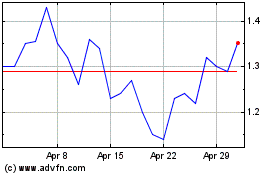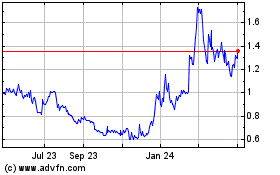Passage Bio Receives Rare Pediatric Disease Designation for PBGM01 for Patients with GM1 Gangliosidosis
May 21 2020 - 8:00AM

Passage Bio, Inc. (NASDAQ: PASG), a genetic medicines company
focused on developing transformative therapies for rare, monogenic
central nervous system disorders, today announced the U.S. Food and
Drug Administration (FDA) has granted Rare Pediatric Disease (RPD)
designation to PBGM01 broadly for the treatment of GM1
gangliosidosis. PBGM01 is an AAV-delivery gene therapy currently
being developed for the treatment of infantile GM1 gangliosidosis
(GM1) and has previously been granted Orphan Drug designation.
“This is the second regulatory designation we have received from
the FDA for our lead program in GM1 and reflects the high unmet
need in this patient population,” said Bruce Goldsmith, Ph.D,
president and chief executive officer of Passage Bio. “As a company
we are committed to developing therapies that transform the lives
of patients suffering from serious life-threatening CNS disorders.
We believe that PBGM01 has the potential to restore developmental
progression, enabling patients to achieve additional milestones and
improve quality of life. We look forward to advancing PBGM01 into
clinical testing later this year.”
RPD designation is granted by the FDA to encourage treatments
for serious or life-threatening diseases primarily affecting
children 18 years of age and younger and fewer than 200,000 people
in the United States. Under the RPD program, a sponsor who receives
approval for a drug or biologic for a “rare pediatric disease” may
qualify for a priority review voucher that may be sold or
transferred.
Passage anticipates starting a Phase 1/2 trial for PBGM01 for
the treatment infantile GM1 in the fourth quarter of 2020. The
trial will be an open-label, dose escalation study of PBGM01
administered by a single injection into the intra cisterna magna,
or ICM, in pediatric subjects with infantile GM1.
About GM1GM1 gangliosidosis (GM1) is a rare and
often life-threatening monogenic recessive lysosomal storage
disease caused by mutations in the GLB1 gene, which encodes
lysosomal acid beta-galactosidase (β-gal). Reduced β-gal activity
results in the accumulation of toxic levels of GM1 ganglioside in
neurons throughout the brain, causing rapidly progressing
neurodegeneration. GM1 manifests as a continuum of disease and is
most severe in the Infantile form, which is characterized by onset
in the first 6 months of life with hypotonia (reduced muscle tone),
progressive CNS dysfunction, and rapid developmental regression.
Life expectancy for infants with GM1 is two to four years, and
infantile GM1 represents approximately 62.5% of the incidence of
0.5 to 1 in 100,000 live births. Currently, there are no approved
disease-modifying therapies available.
About PBGM01PBGM01 is an AAV-delivery gene
therapy currently being developed for the treatment of infantile
GM1, in which patients have mutations in the GLB1 gene causing
little or no residual β-gal enzyme activity and subsequent
neurodegeneration. PBGM01 utilizes a next-generation AAVhu68 capsid
administered through intra-cisterna magna (ICM) to deliver a
functional GLB1 gene encoding β-gal to the brain and peripheral
tissues. By reducing the accumulation of GM1 gangliosides, PBGM01
has the potential to reverse neuronal toxicity, thereby restoring
developmental potential. In preclinical models, PBGM01 has
demonstrated broad brain distribution and wide uptake of the β-gal
enzyme in both the central nervous system (CNS) and critical
peripheral organs, suggesting potential treatment for both the CNS
and peripheral manifestations of GM1. The Company has received
Orphan Drug and Rare Pediatric Disease designation for PBGM01 for
patients with GM1 and plans to initiate a Phase 1/2 trial in the
fourth quarter of 2020 with initial 30 day safety and biomarker
data expected in the late first half of 2021.
About Passage Bio Passage Bio is a genetic
medicines company focused on developing transformative therapies
for rare, monogenic central nervous system disorders with limited
or no approved treatment options. The company is based in
Philadelphia, PA and has a research, collaboration and license
agreement with the University of Pennsylvania and its Gene Therapy
Program (GTP). The GTP conducts discovery and IND-enabling
preclinical work and Passage Bio conducts all clinical development,
regulatory strategy and commercialization activities under the
agreement. The company has a development portfolio of six product
candidates, with the option to license eleven more, with lead
programs in GM1 gangliosidosis, frontotemporal dementia and Krabbe
disease.
Forward-Looking StatementsThis press release
contains “forward-looking statements” within the meaning of, and
made pursuant to the safe harbor provisions of, the Private
Securities Litigation Reform Act of 1995, including, but not
limited to: our expectations about timing and execution of
anticipated milestones, including our planned IND submissions,
initiation of clinical trials and the availability of clinical data
from such trials; our expectations about our collaborators’ and
partners’ ability to execute key initiatives; the ability to
receive and use an RPD voucher; and the ability of our lead product
candidates to treat the underlying causes of their respective
target monogenic CNS disorders. These forward-looking statements
may be accompanied by such words as “aim,” “anticipate,” “believe,”
“could,” “estimate,” “expect,” “forecast,” “goal,” “intend,” “may,”
“might,” “plan,” “potential,” “possible,” “will,” “would,” and
other words and terms of similar meaning. These statements involve
risks and uncertainties that could cause actual results to differ
materially from those reflected in such statements, including: our
ability to develop, obtain regulatory approval for and
commercialize our product candidates; the timing and results of
preclinical studies and clinical trials; the risk that positive
results in a preclinical study or clinical trial may not be
replicated in subsequent trials or success in early stage clinical
trials may not be predictive of results in later stage clinical
trials; risks associated with clinical trials, including our
ability to adequately manage clinical activities, unexpected
concerns that may arise from additional data or analysis obtained
during clinical trials, regulatory authorities may require
additional information or further studies, or may fail to approve
or may delay approval of our drug candidates; the occurrence of
adverse safety events; failure to protect and enforce our
intellectual property, and other proprietary rights; failure to
successfully execute or realize the anticipated benefits of our
strategic and growth initiatives; risks relating to technology
failures or breaches; our dependence on collaborators and other
third parties for the development of product candidates and other
aspects of our business, which are outside of our full control;
risks associated with current and potential delays, work stoppages,
or supply chain disruptions caused by the coronavirus pandemic;
risks associated with current and potential future healthcare
reforms; risks relating to attracting and retaining key personnel;
failure to comply with legal and regulatory requirements; risks
relating to access to capital and credit markets; and the other
risks and uncertainties that are described in the Risk Factors
section in documents the company files from time to time with
the Securities and Exchange Commission (SEC), and other
reports as filed with the SEC. Passage Bio undertakes no
obligation to publicly update any forward-looking statement,
whether written or oral, that may be made from time to time,
whether as a result of new information, future developments or
otherwise.
For further information, please contact:
Investors:Sarah McCabeStern Investor Relations,
Inc.212-362-1200sarah.mccabe@sternir.com
Media:Azeem ZeekryaHDMZ312-506-5244azeem.zeekrya@hdmz.com
Passage Bio (NASDAQ:PASG)
Historical Stock Chart
From Oct 2024 to Nov 2024

Passage Bio (NASDAQ:PASG)
Historical Stock Chart
From Nov 2023 to Nov 2024
